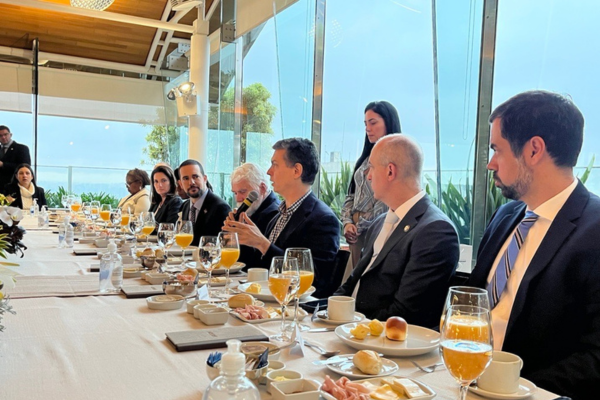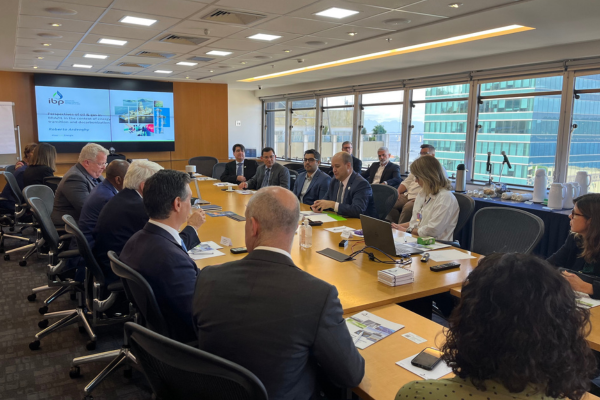Houston Delegation Travels to Brazil to Strengthen Global Ties
Published May 03, 2023 by Taylor Tatum
Investment opportunities in energy transition, manufacturing, technology, and the port were the focus of a recent trade and investment mission to Houston’s fourth-largest international trading partner, Brazil. The Greater Houston Partnership, Mayor Sylvester Turner, and the Brazil-Texas Chamber of Commerce led the week-long mission to promote the Houston region as a top global destination for trade and investment.
Houston-Brazil trade has grown steadily since 2016, despite a dip in 2020. In 2022, trade increased by 20% to $20.1 billion from $16.8 billion in 2021. More than 8,135 people living in metro Houston were born in Brazil.
“Brazil is one of Houston’s most important international partners, with a record-breaking year for trade in 2022,” said John Cypher, Vice President of International Investment and Trade at the Partnership. “A number of Brazilian companies already have significant investment in Houston including Oxiteno, Petrobas and Novonor.”
Seven Brazilian firms operate 12 subsidiaries in the Houston area and 44 Houston firms operate 119 subsidiary locations in Brazil including Airswift, McDermott and SLB.
The delegation also included Houston business leaders from the Houston Airport System, Port Houston, United Airlines, Radix, EPAM Systems, MCA Engineering LLC and Squire Patton Boggs LLP. High-level meetings included:
-
Eduardo Paes, Mayor of Rio de Janeiro
-
Claudio Castro, Governor of Rio de Janeiro
-
Marilia Marton, Secretary of Culture and Creative Economy of the State of Sao Paulo
-
Petrobras, a state-owned Brazilian multinational corporation in the petroleum industry.
-
BRASKEM
-
Radix
-
Novonor
-
Raizen
Additionally, members of the Partnership’s International Investment & Trade team promoted Houston’s emerging digital technology and innovation ecosystem during meetings with Invest Sao Paulo, Brazilian National Agency of Petroleum, Natural Gas and Biofuels (ANP), Federation of Industries of the State of São Paulo (FIESP), and AMCHAM.
Houston’s energy transition efforts and the importance of building stronger ties with our South American allies to bolster these efforts took center stage in meetings with Porto do Açu, the Industry Federation for the State of Rio de Janeiro (Firjan), and the Brazilian Institute of Oil & Gas. Representatives including IBP President and CEO Roberto Ardenghy, Radix CEO João Carlos Chachamovitz, and Sotreq S.A. CEO Marcelo Orberg discussed accelerating low-carbon industrialization and sustainable development.
According to Cypher, the ports in Brazil are looking to Houston for how to best support the energy transition. The ports are building numerous terminals that will contribute to energy transition efforts, including hydrogen, carbon capture and sequestration.
The delegation also met with Mauricio Tomalsquim, Director of Energy Transition and Sustainability from Petrobras, who shared recent developments in Brazil’s energy transition space. Following productive meetings in Brazil, the Partnership and the Houston Energy Transition Initiative team hosted an in-bound delegation of Petrobras' representatives during the Offshore Technology Conference in Houston to discuss challenges and opportunities in CCUS and hydrogen for both regions as part of continued efforts to facilitate collaboration and business development.
Learn more about international business in Houston.
 The Houston Report
The Houston Report




















